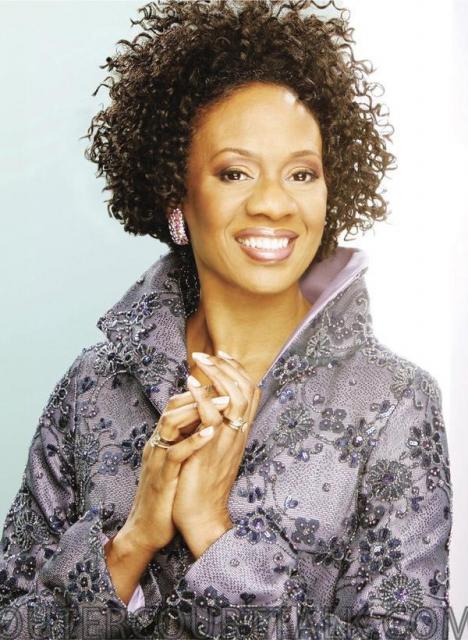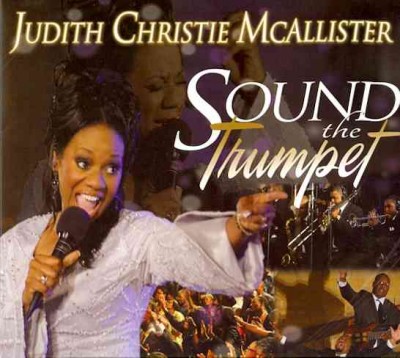Judith Christie McAllister: ‘It’s important to me: to not only reach my generation but also to reach back and give something to the generation before me…and give something to the generation ahead of me that they can identify with.’Grounded in Tradition, Judith Christie McAllister Embraces the Future
By Bob Marovich
Think of Judith Christie McAllister and chances are "praise and worship" comes to mind. After all, she's known as the "First Lady of Praise & Worship."
But as McAllister explained shortly after the release of her new CD, Sound the Trumpet (Shanachie), her musical roots are steeped in the classics and sacred hymnody.
I understand your father was from Jamaica and your mother was from Barbados. Did the music of your parents’ home countries influence your musical style in any way?
Oh, absolutely, absolutely! But growing up in a Caribbean household did not prevent me from being influenced also by the classics, which is what I primarily studied as a child. I was trained classically in piano and didn’t venture into gospel music until I became a teenager.
My mother would only let us listen to hymns and standard sacred music. There was a family radio station where I grew up that used to play a lot of a cappella hymns. That was the only music my mother would allow us to listen to. Thank God she did, because it gave me such a rooted and firm approach to music.
Judith Christie McAllister, ‘Sound The Trumpet,’ from the like-titled album.Who in gospel music did you listen to as a teenager?
There were so many: Andrae Crouch, Walter Hawkins, James Cleveland, Albertina Walker, Mahalia Jackson, Aretha Franklin and some of the up-and-coming artists, such as a choir director from Hempstead, New York named Benny Cummings. He’s since passed away, but he was very influential in the late '70s and the early '80s with a new choir sound. I always wanted to have an opportunity to influence music the way he did.
How did you become associated with the West Angeles Church of God in Christ?
I was singing on a daily television program at Oral Roberts University and my husband--at the time he was my fiancé--was one of the guest coordinators for the show, which meant he would pick up artists and guests and accommodate them while they were there for the program. One day my husband picked up Bishop [Charles] Blake [Pastor of West Angeles COGIC]. They began to converse and Bishop Blake asked him about his plans for the future. He said there were a number of things he'd like to do, but he didn’t have anything firm at the moment. So Bishop invited him to be his personal aide. Of course, since I was soon to be married to him, I came along. A couple of years later, he left to work for the police department and I stayed. He was at West Angeles two years and I was there for eighteen!
‘When I listen to the album, I’m thinking that God in His sovereignty knew that this time in my life would take place, and He prepared me.’Was it at Oral Roberts University where you got into the praise and worship style?
When I arrived on campus in August of 1985, I was familiar with praise and worship but not the contemporary style that I learned at Oral Roberts University, by having the opportunity to sing on the television show and hearing others perform on the show.
Has your musical style evolved over the years?
Yes, it has, but it still remains grounded in the roots of tradition. Not in the sense of being rigid, but in the roots of the hymns and sacred music. I have at least one hymn or sacred song on all of my projects. That’s important to me: to not only reach my generation but also to reach back and give something to the generation before me…and give something to the generation ahead of me that they can identify with.
Your new album, Sound the Trumpet, was recorded before your life was beset by some personal challenges. What goes through your mind when you listen to the recording now?
I was just telling a friend, "You can’t hate my glory if you don’t know my story." When I listen to the album, that’s what I’m thinking: that God in His sovereignty knew that this time in my life would take place, and He prepared me. He gave me songs that I can refer back to, to see the faithfulness of God, to see that He doesn’t leave a worshipper in the dark.
What are the most meaningful tracks on the album for you?
“Sound the Trumpet,” “Thank You for the Healing” and “Nobody Like the Lord.”
On “Just For Who You Are,” you sing with Nancey Jackson Johnson. I feel it is the best song on the project and Nancey is an underappreciated gospel singer. Singers and musicians know who she is, but the general public doesn’t necessarily know. How did this song come into being?
It came to me in bits and pieces. I remember driving home one day from working out at the Y and I just began to think of God’s goodness. I began to think of everything He was: “You are my help in times of trouble/You are my strength when I am weak. You are my bread, my daily portion/Everything I need you are.” I began to sing it over and over again and just worship.
A lot of the songs that I write come during those inconspicuous moments, not when I’m sitting at the keyboard and saying, "Okay, I have to write a song." Washing the dishes or doing laundry or working out or, as the southern folks say, "making groceries," are times when those types of songs come.
Then I thought, "Now who can best communicate this song in the way that I feel it?" Nancey was the first face to pop up. Having known Nancey and having fellowshipped with her and mentored her at some level, I knew she was the one.
I concur totally that the world is not yet privy to her awesome talent and I figured since I had this platform, and since people know my name as it relates to praise and worship, that it was my responsibility to open up doors for others that may need a platform, even though Nancey had a project out years ago, a fabulous album.
Judith Christie McAllister, ‘Thank You For The Healing,’ from the Sound The Trumpet albumDo you find a lot of your classical training comes into play when you write and sing?
Absolutely. Chord structure, how things must make sense musically. At the end of “Just For Who You Are,” the vocal chording is not a traditional I-III-V but it has a little jazz influence. I try to do that with a lot of my songs: throw something in there to make the ear go “hmmm!”
What can we expect from you in the next few months?
I want to do another praise and worship project with singers who are as yet unknown to the world but need to be known. I will use my name as a platform so people can be blessed by their ministry.
But I would also like to do a project of hymns--nothing but hymns--and update them a little so the generation coming up--the one ahead of me--can appreciate them.
Hymns like “A Mighty Fortress Is Our God” or “It Is Well With My Soul” have meat to them. They have stood the test of time. But for the most part, we don’t sing hymns in our churches anymore. It’s a dying art. I want to restore them in a manner by which new generations can identify with them musically, but also gain the rich heritage of the words.
Judith Christie McAllister’s Sound the Trumpet is available at www.amazon.com
Bob Marovich is a gospel music historian, radio announcer, and author. In its seventh season, Bob's "Gospel Memories" program of vintage black gospel music and artist interviews airs live first Sundays from 3:00 to 7:30 a.m. on Chicago's WLUW 88.7 FM, and streams live at http://www.wluw.org. Snippets of recent broadcasts can be heard at http://www.gospelmemories.com/. Bob is also editor of The Black Gospel Blog.
Founder/Publisher/Editor: David McGee
Contributing Editors: Billy Altman, Laura Fissinger, Christopher Hill, Derk Richardson
Logo Design: John Mendelsohn (www.johnmendelsohn.com)
Website Design: Kieran McGee (www.kieranmcgee.com)
Staff Photographers: Audrey Harrod (Louisville, KY; www.flickr.com/audreyharrod), Alicia Zappier (New York)
E-mail: thebluegrassspecial@gmail.com
Mailing Address: David McGee, 201 W. 85 St.—5B, New York, NY 10024




